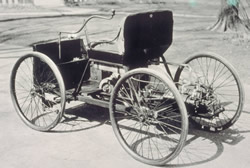June 4.
1584. Sir Walter Raleigh establishes the first English colony on Roanoke Island, old Virginia (now North Carolina). And, of course, in case you were wondering why the capital of North Carolina is Raleigh, now you know...
1615. The forces of Tokugawa take Osaka Castle in Japan after a lengthy siege, ending all resistance to the Tokugawa Shogunate which will lead Japan until the Meiji restoration in the late 1800s.
1896. Henry Ford, in a tiny workshop behind his home at 58 Bagley Avenue, Detroit, completes the Ford Quadricycle, his first gasoline powered automobile, and gives it a successful test run. He named it the Quadricycle because the vehicle ran on four bicycle tires, driven by a chain and a four horsepower engine. You can still see the Quadricycle today at the Henry Ford Museum in Dearborn, Michigan.

1919. The US Congress approves the 19th Amendment, giving the vote to women, and sends it to the states for ratification.
1939. The MS St. Louis is denied port in Florida, after having previously been turned away in Cuba. A German vessel, she is carrying 930 Jewish and 7 non-Jewish refugees seeking to escape Nazi Germany. Efforts to bring the ship to port in Canada are rebuffed by its Prime Minister. Eventually, the ship offloads nearly 300 passengers in England, and the rest in Antwerp where, it is estimated, approximately 200-250 of its passengers end up slain by the Nazis following German occupation of the low countries the following year. The adventures of the ship are memorialized in the 1974 book
Voyage of the Damned. (which, for the sake of full disclosure, I have not read and am not familiar with)
1940. Nazi forces enter Paris.
1942. The Battle of Midway begins, it ends in a resounding victory for the United States only 7 months after it had entered the war as a result of Pearl Harbor, when US forces sink four Japanese aircraft carriers to the loss of only one. The loss of so many large carriers and talented aircrews are effectively irreplaceable for Japan, which struggles to build replacements, while US production is rapidly increasing output. In fact, Japan would not be able to assemble so many fleet carriers until 1944 (which carriers had largely inexperienced aircrews). By comparison, the US had commissioned two dozen fleet and light carriers, as well as a number of escort carriers.
As a result, the US effectively seizes the initiative and puts Japan on the defensive.
1989. The People's Liberation Army (China) [lord, the irony...] liberates the people in Tianamen Square against their will, ending the protests of 1989. The event is sometimes known in China as the "June 4th Massacre", but more popularly as the "June 4 Incident". The date "May 35th" is often used by individuals in China to avoid its government's internet censorship.
1989. Solidarity's victory in the (moderately) free elections in Poland spark off Anti-Communist protests across Eastern Europe, and begin what is known as the Autumn of Nations, in which a number of Eastern European nations throw off the shackles of Communism.